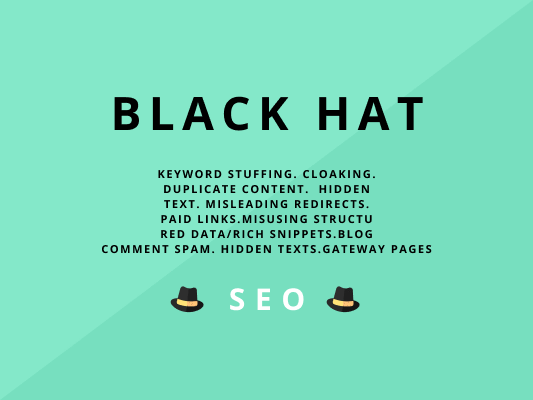Black hat SEO are tactics manipulating search engine algorithms into increasing a website's rankings in SERPs. Read on to learn more about 10 common black hat SEO tactics, and how to avoid them.
Black hat SEO is an illegal practice that goes against search engine guidelines.
Bad actors use it to get their site rankings higher in the SERPs through illegal tactics.
Google always penalize these websites.
These unethical SEO tactics don’t solve anything for the searchers who will complain about their poor user experience with your web page.
Some of the most common black hat SEO techniques include cloaking, publishing poor-quality content, keyword stuffing, and using Private Link Networks (PLNs).
What Is Black Hat SEO?
These are unethical SEO tactics used by some content creators to rank their websites.
However, these illegal SEO techniques violate search engine guidelines.
Black hat SEO attempts to manipulate the search engine algorithms into increasing your website’s overall rankings on the SERPs.

However, search engines are becoming more advanced and technically equipped to identify and tackle black hat SEO techniques.
Search engines like Google and Bing are also quite clear on the repercussions of using such practices that go against their terms of use.

They’ve stated the potential outcomes your website may face when you violate their guidelines.
Your website may either be penalized algorithmically or by manual action.
This may mean anything from pushing your site to lower-ranked positions to declining organic traffic to your website entirely.
Black Hat SEO Techniques
While this practice has been around since the inception of the internet and SEO, most people still don’t know much about them.
Therefore, it can be quite challenging to discern which tactics to use and which ones not to use.
While most SEO basics are quite clear-cut white SEO techniques, others are more advanced techniques that require more attention to detail.
But always remember to follow the right advice.
Some white hat SEO techniques may sound “advanced” and a quick strategy to get you on top of the SERPs.
In reality, they may be leading you toward black hat tactics.
Unfortunately, Google won’t tell the difference and will penalize you all the same if its bots catch up with you.
As such, it’s always important to learn as much as you can about these SEO techniques.
It makes it easier to spot and steer clear of any black hat SEO tactic that might harm your overall rankings.
That said, we compiled a comprehensive list of the top black hat SEO techniques that violate Google’s guidelines.
Avoid using these tactics in 2021 lest you end up suffering the consequences.
1. Keyword Stuffing

Although it’s a slowly dying tactic, some bad actors still use it on their web pages, hoping that it will boost their rankings in the SERPs.
However, with search engines becoming too technologically advanced, repeating specific key phrases in your content excessively won’t increase your rankings.
Keyword stuffing will almost certainly produce the opposite result; a penalty from the search engine.

It’s not uncommon for some content creators to sometimes try to manipulate their site’s rankings by using keywords unnaturally across their web pages.
But these aren’t the old days when you could practice such and get away with it.
Google has become just too clever to fall for that now.
2. Cloaking
Here’s another black hat strategy that search engines loathe.
Cloaking is a black hat tactic where content creators serve different content or web URLs to online users and search engines.
This allows them to provide different experiences on each URL.
It’s a clear attempt to deceive the search engines into ranking your content for a focus keyword that isn’t even related to that content.
It is a deceptive practice that search engines consider a violation of their search engine guidelines.
Ultimately, enough searchers will complain about your website to catch the search engine’s attention.
Ideally, you want to focus on designing the best possible user experience for your visitors.
3. Duplicate Content
Ever heard of the term “plagiarism?”
This is it!
Creating great content isn’t easy.
But that doesn’t mean you go out of your way to steal someone else’s content to publish as your own.
That’s just wrong.
And you won’t get too far with this unethical practice.
There’s no hiding the fact that creating original content remains among the top three ranking factors on Google.
Some black hat actors automatically generate content to rank in the SERPs for a large volume of keywords.
They don’t even go out of their way to create useful and unique content.
Google considers this a violation of its search engine guidelines and will penalize you for practicing it.
Ultimately, the risks of using duplicate content are just too high.
You’ll never hide from Google for long enough to get reasonable results from this dubious act.
The best alternative is to take your time and be sure to create great content that your audience finds interesting, highly informative, and engaging.
Creating SEO-friendly content is the best strategy to avoid such issues caused by low-quality or duplicated content.
4. Hidden Text
Hidden text is any text that’s hidden from the user’s vision but meant for the search engines to find and use to rank content.
It’s usually text written in the same color as the background that’s positioned off the screen.
It can also be behind an image to try and manipulate Google’s search rankings.
Hiding text is one of the most deceptive and intentional tactics used by black hat SEO experts.
Most hidden texts are always in the form of excessive keywords or several other words that don’t make sense.
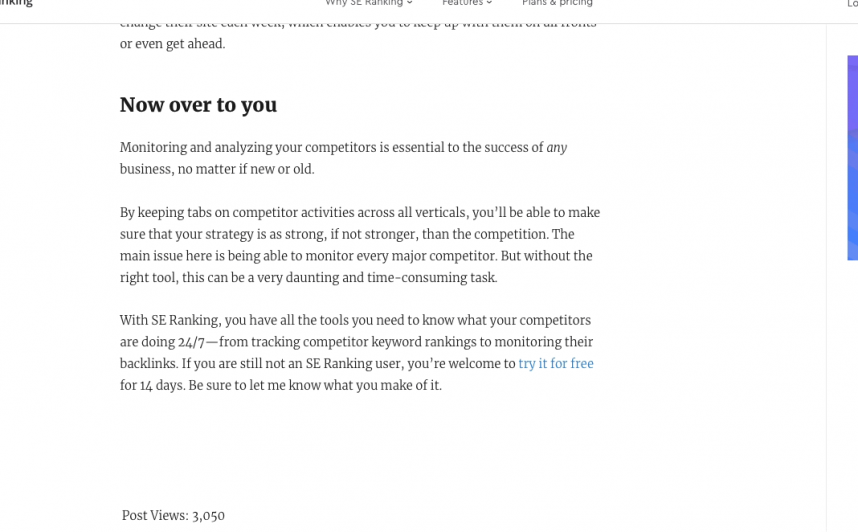
Text can be hidden in several ways, including:
- Using text behind an image
- Making the text color the same as its background
- Using CSS to position your text off-screen
- Hiding links by only linking small characters like hyphens in the middle of paragraphs
- Setting the font size to zero
Most hidden texts are meant to not be easily viewable by online users.
They are solely meant for search engines that will still pick them up and, to the actor’s hope, rank their websites.
We definitely won’t recommend any website owner to practice this unethical tactic on their website.
Search engines are now too advanced for such tricks.
Google now has far more sophisticated crawlers that pick up such unethical acts and will penalize you ruthlessly.
5. Sneaky Redirects

Redirecting links is like sending online users to different URLs than the one they had initially requested.
You may have fallen victim to this black hat tactic once or twice.
However, redirecting your website from one URL to another isn’t all bad.
You may be redirecting visitors from your old URL to a new one or consolidating several web pages into one.
But some redirects are meant to deceive the search engines.
They also display content to users that’s different from what was made available to search crawlers.
Google and other major search engines highly discourage this and penalize any website found to practice sneaky web redirects.
Like cloaking, sneaky redirects are deceptive.
The URL attempts to display content other than what the user intended from the search engine results page.
6. Paid Links
Using link schemes in web pages is another common black hat SEO tactic that’s still used today.
Here’s where a lot of confusion originates.
The best white hat SEO tactic here is to write content that appeals to the user.
Not only that, ensure it is informative and engaging enough to make them want to stay.
You shouldn’t be hiding text either.
But link building is a little more complex.
If we’re to go by Google’s guidelines, links should be earned.
This is because they’re considered to be editorial votes of trust.
Therefore, it’s good practice to avoid linking tactics like:
- Paid or sponsored links
- Excessive link exchanges
- Forum spam
- Blog comment spam
- Automated link building
- Sidebar or site-wide links
- Spammy directories and bookmarking sites
- Large-scale article marketing and guest posting campaigns
Essentially, buying or selling web links that pass PageRank violates search engine guidelines.
7. Misusing Structured Data/Rich Snippets
Structured data helps define actions, entities, and relationships online.
But black hat SEO techniques have a way of abusing and misusing this type of markup.
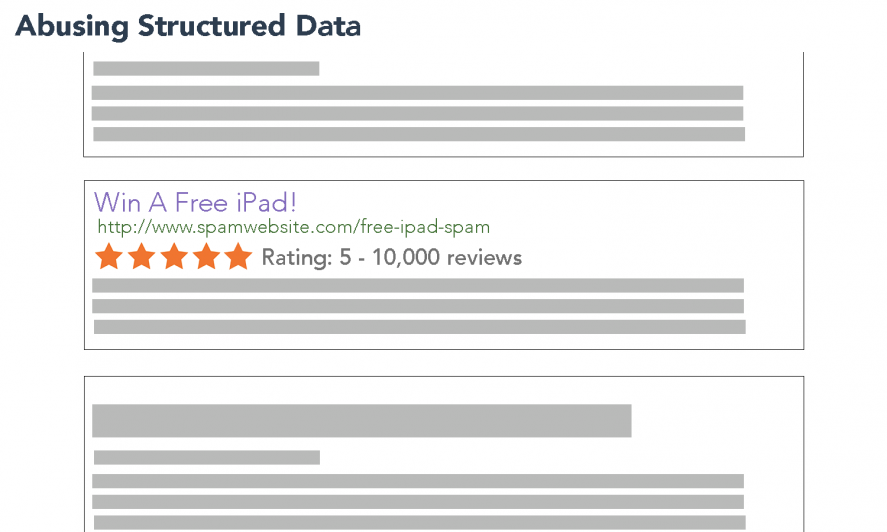
Usually, this means using structured data to provide users with factually incorrect information.
Many marketers create fake reviews with 5-star ratings.
Their aim is to dupe search engines into believing their websites are authoritative.
Misusing structured data/rich snippets is pure deception that should be avoided at all costs.
8. Blog Comment Spam
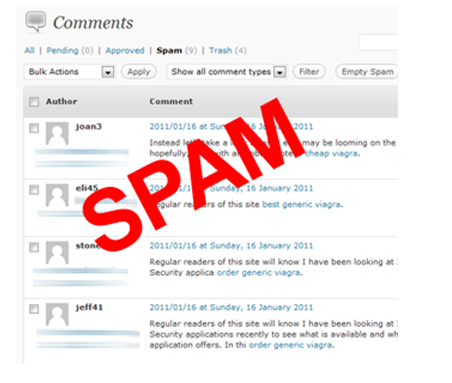
Here’s another black hat SEO tactic that’s just as devious and can attract hefty penalties from Google and other major search engines.
It involves including a link to your site in the blog comments section.
Blog comment spamming happens less often nowadays.
Search engines like Google have more updated algorithms that discount any links in the blog comments section.
The most authoritative blogs also make having links in the blog comments “nofollow” by default.
So, search engines don’t follow such links.
Nor do they pass any authority.
Therefore, commenting on multiple blog post comment sections with links back to your website is no longer effective.
9. Gateway Pages
Gateway pages are web pages that target specific search queries in the SERPs with content intended to act only as a funnel to a specific web page.
Search engines detest this act and discourage content marketers from using this tactic to form doorway or gateway pages for their sites.
Always ensure that every piece of content on your website has a specific purpose.
You shouldn’t just be creating web pages to rank for specific keywords that aren’t entirely relevant.
Remember, you’re creating content for humans, not the search engines.
10. Negative SEO

Some unethical SEO actors even go as far as using negative SEO to reduce their competitor’s rankings.
This can be anything that violates Google’s guidelines on your competitor’s website instead of your own.
While it’s not a very common black hat SEO strategy, Google is getting better at ignoring this strategy.
For instance, bad actors may decide to flood your website with multiple unnatural links hoping that Google penalizes your website.
But with search engines becoming cleverer by the day, this black hat SEO tactic isn’t making much headway in the SERPs.
Avoiding Black Hat SEO

Now that you know these black hat SEO techniques, the next step is to learn how best to avoid them.
The strategies mentioned above may trick you into boosting your search rankings.
But they’ll eventually land you in trouble.
Black hat SEO is undoubtedly a risky business.
It’s not worth exposing your content or web pages to these unethical tactics.
Here are the best strategies to help you avoid black hat SEO.
Write New Content To Avoid Duplicates
You should learn to treat online users and search engines the same way.
Avoid using illegal techniques like cloaking or spammy redirects to be in Google’s good books.
Focus your efforts on solving the searcher’s pain points and questions.
BiQ’s Keyword Intelligence is the best tool that will help you find new content ideas.
This will enable you to make even greater blog posts for your target audience.
You can also use BiQ’s Content Ideas feature in BiQ’s Keyword Intelligence to find the best content ideas that your readers will love.
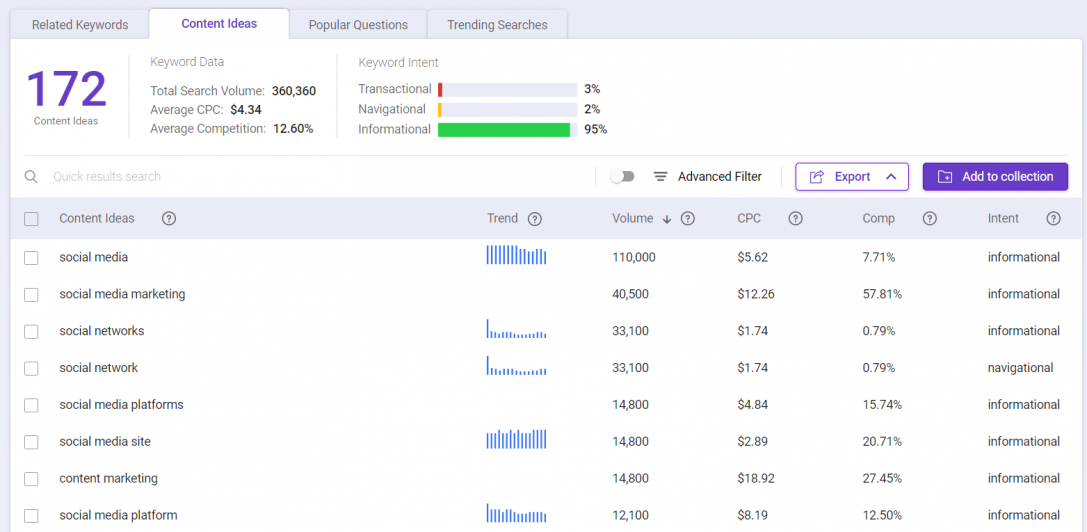
All keywords also come with a set of metrics you can use to decide which topics to focus on more, based on searcher intent.
Avoid Keyword Stuffing
Keyword stuffing is one of the most common and most abused black hat SEO tactics out there.
The best way to avoid it is by writing good quality and original content without stuffing keywords into it.
You also want to avoid scrapping, duplicating, or rewording content that doesn’t belong to you.
BiQ’s Content Intelligence allows you to achieve semantic content excellence.
It also allows your website to compete for higher ranking spots in the SERPs.
It’s now more important than ever to publish refined content that both search engines and searchers find informative and engaging.
BiQ’s Content Intelligence metrics provide customers with critical data aimed at improving site visibility and rankings.
These metrics matter a lot when it comes to SEO and improves your overall rankings in the SERPs when applied properly.
Google always strives to deliver high-quality content for its customers.
That means you must work on delivering nothing short of quality posts.
Follow Google’s Guidelines

By far, this is the best strategy to steer clear of any black hat SEO tactics.
Google has a clear set of guidelines and conditions set against the use of black hat SEO techniques.
Best believe that Google imposes harsh penalties on websites that violate these guidelines.
Stick With White Hat SEO Strategies

All black hat SEO tactics go against search engine guidelines since they are used to manipulate search engines into gaining higher rankings.
This can lead to websites being wiped from search engines completely or gaining lower positions than you would have wanted.
White hat SEO is the more ethical solution to your web page rankings and visibility woes.
White hat SEO is the most effective strategy to avoid Google penalties and create quality content for a great user experience.
Conclusion
The difference between white hat SEOs and black hat SEOs lies largely in how each builds their respective domain authorities.
Basically, white hat SEO does it honestly.
While black hat SEO does it dishonestly.
Just remember, you don’t necessarily have to give away your standing to succeed in SEO and rank high in the SERPs.
If you do it the right way, you’ll have a much better chance of winning in the long run.
The message?
Avoid using black hat SEO techniques in your posts!



